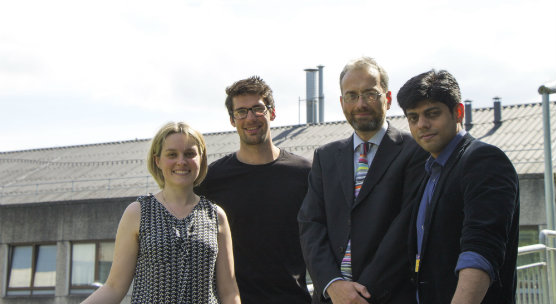Award for ‘outstanding’ research
Published On Wed 9 Nov 2016 by Grant Hill

Scientists from the University of Dundee have written one of the five most outstanding research papers of the past year, according to a prestigious academic journal.
An international study led by Professor Chim Lang and Dr Graham Rena at Dundee’s Division of Molecular and Clinical Medicine showed how Metformin, the world’s most commonly used Type 2 diabetes drug, may be ‘repurposed’ to treat non-diabetic conditions.
The paper was published in Circulation Research in August and has been named in the journal’s Best Manuscript Awards 2016 alongside four other scientific papers from around the world. Dr Rena will accept the award on behalf of the team at a ceremony in New Orleans on Sunday, November 13th.
“I will be immensely proud to pick up this award on behalf of myself and my colleagues,” said Dr Rena. “This is fantastic international recognition for Dundee and the research that takes place within our School of Medicine.
“This was a real collaborative effort and the award is for every single member of the team who played their part. More importantly, this research may one day help to treat people around the world with a wide variety of non-diabetic conditions.”
The Dundee team’s work suggests there is now strong evidence that Metformin exhibits an anti-inflammatory action which may prove significant in non-diabetic cardiovascular disease. Inflammation is understood to contribute to cardiovascular disease (CVD) but existing nonsteroidal anti-inflammatory drugs (NSAIDs) have shown limited utility in CVD treatment.
Metformin, used by hundreds of millions of people with Type 2 diabetes worldwide, has been in use for over 50 years but continues to reveal significant possibilities for treatments other than those for diabetes.
Other recent studies undertaken at the University have shown that metformin may help treat Alzheimer’s disease and could potentially prevent cancer. The drug is also undergoing new clinical trials to determine if it can promote healthy aging.
This report, however, finds that THE anti-inflammatory effects of metformin are exerted irrespective of diabetes status.
The research, a collaboration with researchers in Paris and Helsinki, is currently one of the most read papers on the website of Circulation Research, one of the most prestigious cardiovascular medicine journals.
The UK arm of the study was funded by the Medical Research Council, Diabetes UK and British Heart Foundation.
The judges for Circulation Research’s Best Manuscript Awards 2016 looked for “high standards of scientific excellence in terms of novelty, impact and methodology,” said Roberto Bolli, M.D., editor-in-chief, in a letter to the Dundee researchers. They also looked at the number of times the article has been read online .
Notes to editors:
About the University of Dundee
The University of Dundee is the top ranked University in the UK for biological sciences, according to the 2014 Research Excellence Framework. The University is an internationally recognised centre of excellence in diabetes research, hosting over 20 research groups that include some of the world’s most cited scientists.
Dundee is internationally recognised for the quality of its teaching and research and has a core mission to transform lives across society. More than 17,000 students are enrolled at Dundee, helping make the city Scotland’s most student-friendly. The University is the central hub for a multi-million pound biotechnology sector in the east of Scotland, which now accounts for 16% of the local economy.
The School of Medicine
- Ranked 1st in Scotland and 5th in the UK for Medicine in the Guardian University League Table 2017.
- Ranked 7th in the UK for impact on global health by the All-Party Parliamentary Group on Global Health.
- Dundee’s Medical graduates consistently rank in the top 5 for graduate preparedness for early postgraduate training.
For media enquiries contact:
Grant Hill
Press Officer
University of Dundee
Nethergate, Dundee, DD1 4HN
Tel: +44 (0)1382 384768
Mobile: 07854 953277
Email: g.hill@dundee.ac.uk